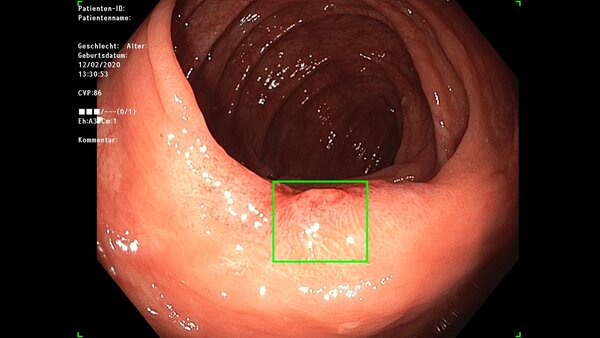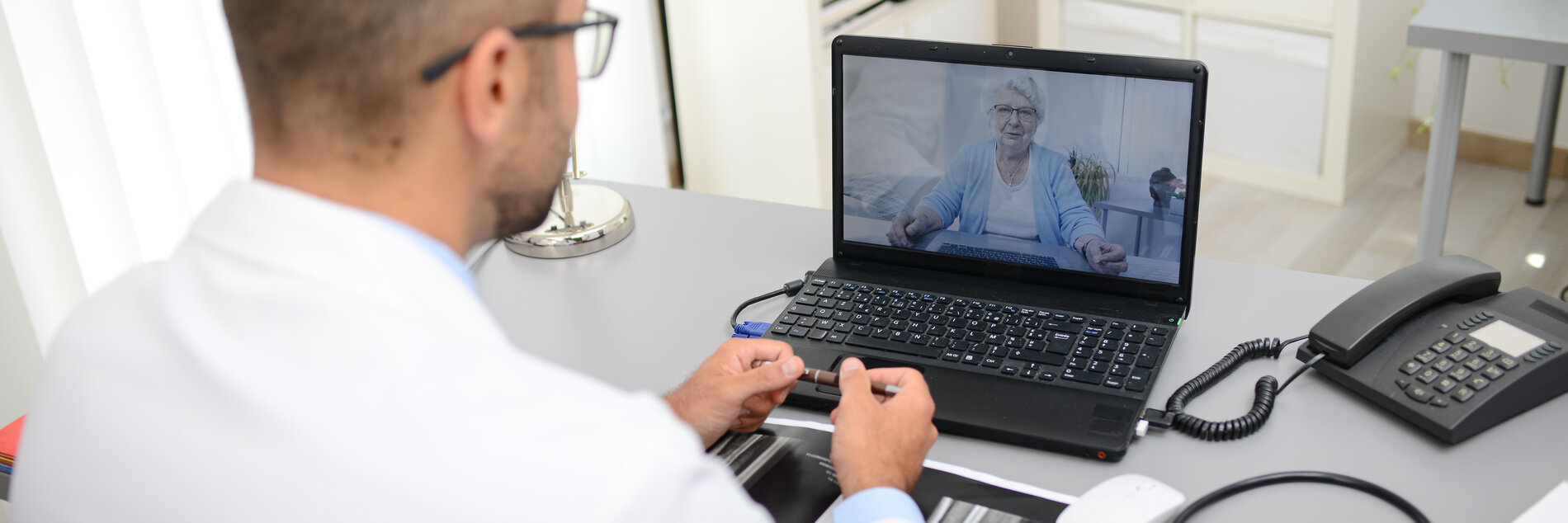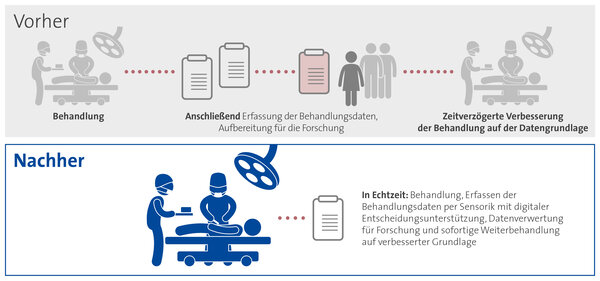Digitization projects at the University Medical Center Freiburg (examples)
Digitalization is a key technology for future-proofing the healthcare sector. With intelligent and innovative solutions, it is possible to improve the quality of care for patients, reduce the workload of employees and act in a more economically and ecologically sustainable way.
Virtual reality for heart surgery
Virtual reality (VR) offers many possibilities in the field of cardiac medicine: Experts from radiology, cardiology and cardiac surgery can view three-dimensional images of the heart and make joint decisions on whether the procedure should be minimally invasive or involve open surgery. Thanks to new digital processing methods, the computer tomographic images are of photorealistic quality.
Quality in real time
Every treatment of our patients is extensively documented. The subsequent evaluation of the data helps us to continuously improve the treatment of future patients. Digitalization gives us the opportunity to gain these insights in real time and apply them without delay.
For example, computers calculate the most effective treatment methods based on tumor characteristics, patient data and empirical values if they have previously been able to train their artificial intelligence with the help of data from thousands of patients. This method of information processing is called deep learning. The system recognizes anomalies and repetitive faulty patterns from the data and thus helps to avoid them before they happen.
Digital emergency center
Our interdisciplinary team at the University Emergency Center (UNZ) treats around 50,000 patients with acute, sometimes life-threatening conditions every year. Serious emergencies are announced in advance by the emergency control center. Important information can be transmitted to the emergency center before arrival. Vital data such as blood pressure, oxygen saturation and heart rate are automatically and continuously transferred to the digital patient file on site to ensure tailored preparation and treatment.
Artificial intelligence in colorectal cancer screening

The University Medical Center Freiburg is the first German university hospital to use a procedure that uses artificial intelligence to detect precancerous lesions. For the procedure, the AI analyzes live video images during the colonoscopy and marks even very small suspicious areas. The doctor assesses these and decides on further treatment, based on a deep learning system that is trained using thousands of precancerous images. The software develops its own search patterns and thus increases the success rate for recognizing the corresponding tissue.
The result: the identification of precancerous lesions has been increased by around 10 percent.
Using health data for medical research
As part of the German government's medical informatics initiative, joint projects are funded that securely process patient health data and make it accessible to participating clinics in order to find comparative cases and enable customized therapies. This includes the PM⁴Onco joint project on personalized cancer medicine coordinated at the University Medical Center Freiburg
The Medical Informatics Initiative provides information on the secure and responsible use of health data for medical research purposes at www.vernetzen-forschen-heilen.de
Patient infotainment directly at the bedside
By equipping around 1,400 beds with multimedia terminals, patients have a modern entertainment and communication medium at their disposal. In addition to information about the hospital and free TV, radio and games, patients are offered free internet access and flat-rate telephony.
Patients are also increasingly being integrated into the hospital's digital processes with the help of this platform. For example, elective service patients are asked about their satisfaction with our additional services directly at their bedside and digitally via the patient infotainment system. Meal ordering has also been possible via the terminal since spring 2022. We are currently working on informing patients in advance about upcoming collections by patient logistics.
Virtual medical consultations in South Baden
Neurologists, neurosurgeons and trauma surgeons from seven clinics in South Baden have joined forces to form a teleradiology network in order to secure and continuously develop radiological care in the region. From a hundred kilometers away, they connect directly to the patient's bedside via video conference. Fully automated digitalized image processing and mobile presentations of results support them in the rapid, targeted diagnosis of acute strokes, for example.
At the same time, around 40,000 radiological images arrive at the University Medical Center Freiburg every day, whether as emergencies or for a second opinion. Complex amounts of data, the analysis of which offers great potential for tailoring patient care more and more individually. Artificial intelligence supports this task and helps to detect pathological changes earlier. For example, machine learning is used for the differential diagnosis of neurodegenerative diseases and neural network analyses ("deep learning") are used to detect lesions in multiple sclerosis, for example.
Virtual patient consultations
Video contact is also playing an increasingly important role in outpatient care. More than 40 departments at the University Medical Center Freiburg already offer the option of secure video consultations. In times of the coronavirus pandemic, this reduces the risk of infection and saves patients the often long journey to the experts at the University Medical Center Freiburg. The Interdisciplinary Pain Center at the University Medical Center Freiburg (ISZ) was one of the few pain centers in Germany that was able to remain open throughout the pandemic. Every month, a team of around eight doctors holds at least 40 to 50 one-hour video consultations. That is around half of all the consultations offered at the ISZ.
LESTOR: Start treating strokes as soon as the emergency report is received
According to the WHO, strokes are the most common cause of serious disability worldwide and the second most common cause of death in adulthood. In Germany, around 270,000 people suffer a stroke every year. In the case of ischemic strokes (i.e. caused by a vascular occlusion, approx. 80%), the chances of recovery are very good in the first few hours, but their success decreases sharply with increasing time until intervention ("time is brain").
In order to optimize the care of patients with strokes, those patients with an urgent suspicion of a large vessel occlusion, a so-called LVO, should already be identified by the control centre dispatchers during the emergency notification. LESTOR is the abbreviation for control centre-based identificationof stroke patientsfor thrombectomyand subsequent optimizationof the rescue chain. The innovative concept aims to detect LVO (Large Vessel Occlusion) strokes during the emergency notification and initiate initial measures for care.
Find out more about the LESTOR project here
Translation Center - Digitalization in medicine
The development of new digital solutions in the healthcare sector poses a major challenge due to the special ethical, medical and regulatory conditions. Digital health start-ups in particular, but also SMEs, often lack access to routine clinical practice in order to develop and test products in a protected environment in everyday clinical practice. In addition, the certification of medical devices may require a clinical study or application observations (real world data).
In this development process, the Translational Center of the University Medical Center Freiburg can be an important bridge between development and market readiness. In the sense of a living lab, it offers the opportunity to advance new technologies in a practical manner under optimal conditions so that they can benefit as many patients as possible as soon as possible.
The Living Lab
The Living Lab is located at the Neurocenter of the University Medical Center Freiburg. It has a high level of patient diversity, acute and chronic disease progression, surgical and conservative therapies and close links to referring physicians and aftercare facilities. In addition, employees are highly open to innovations, new technologies and research activities (with exemplary projects in nursing research - mobility monitoring). Employees with IT experience are available. A telematics infrastructure-compatible exchange of data outside the hospital is also being considered. This makes it possible to stay in contact with patients for prevention or aftercare as well as with pre- and post-treatment providers.



